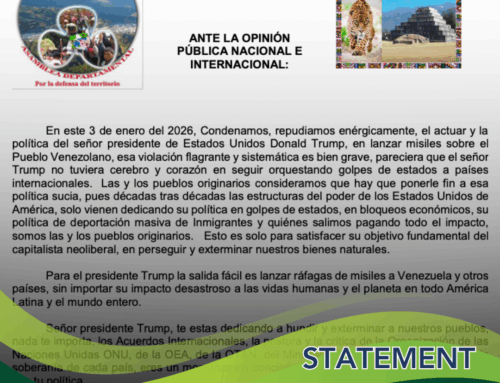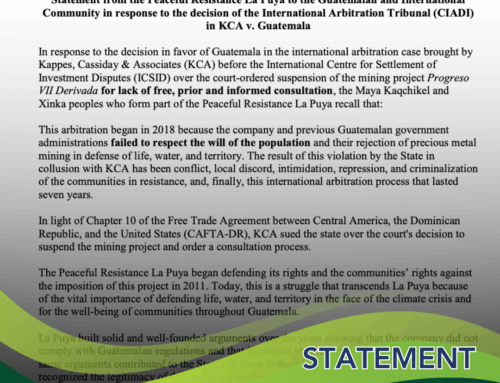 |
| Jalapa has said NO to mining. Photo: Xinka Parliament |
On Sunday, November 10, in a community consultation in the municipality of Jalapa, 23,152 people said NO to chemical metal mining.
Members of Santa María Xalapán and other indigenous Xinca communities in Jalapa requested the popular vote in order to address the threat of environmental and social impacts from the nearby Escobal silver mine, owned by Tahoe Resources. Nearly 24,000 people participated in the vote. Over 98% of all participants voted against mining while 1.71% voted in favor.
| Do you agree with the development, installation and operation of chemical metal mining in any part of the municipality of Jalapa? YES or NO. Photo: CPR Urbana |
In 2011, other municipalities surrounding the Escobal mine began holding municipal-level popular votes on the issue of mining. Casillas, Nueva Santa Rosa and Santa Rosa Lima were the first to hold votes in the department of Santa Rosa. In 2012, Matasquintla in the department of Jalapa also held a consultation. All four votes resulted in the overwhelming rejection of mining on their territory.
This year, the municipality of San Rafael Las Flores, where the Escobal mine is located, planned to hold a municipal wide consultation but their request was denied. Instead, individual communities in the municipality organized community-level consultations. Eight of San Rafael Las Flores’ 26 communities completed popular votes when the process was cut short due to a government declared state of siege in May. The community consultation earlier this month in Jalapa marks the first popular vote surrounding the Escobal mine since the state of siege.
| Participants in the community consultation show off their inked fingers, a sign of their vote. Photo: CPR Urbana |
Meanwhile, in a separate process of legitimate opposition to mining, Quelvin Jiménez continues to defend his legal right to have his voice heard. Jiménez, along with over 200 other complainants, filed legal complaints against Tahoe Resources regarding potential social and environmental impacts from the company’s Escobal project. While individual legal complaints are less utilized than the community consultation process to express opposition to mining projects, they are protected under Guatemala’s mining law.
The Ministry of Energy and Mines (MEM) ignored community opposition to the Escobal mine and rejected the 200+ complaints in April of this year, just before granting Tahoe Resources the mining license necessary to move forward with production. Jiménez, with legal support from the Center for Environmental and Social Legal Action (CALAS), appealed MEM’s rejection of his complaint, citing lack of due process. The appeal was upheld in July, which CALAS interpreted to mean the suspension of Tahoe Resources’ license. However, Minera San Rafael, Tahoe’s Guatemalan subsidiary, put forward another legal appeal against the decision, sending Jiménez’ case to Guatemala’s Constitutional Court.
Hundreds of supporters from the legitimate resistance to the Escobal mine traveled in to Guatemala City to attend the Constitutional Court hearing this past November 5. Jiménez, before a packed room, defended his legal right to self-determination. He reflected on the process saying, “We hope the court respects our rights, that justice be fulfilled, not just for me but for all the communities.“
A community member in the attendance also commented on the hearing, “They think they can take the law in their own hands but there is rule of law in Guatemala and it must be respected… We are demanding our rights be respected.”
CALAS and Jiménez currently await notification from the Constitutional Court regarding its resolution.






Leave A Comment